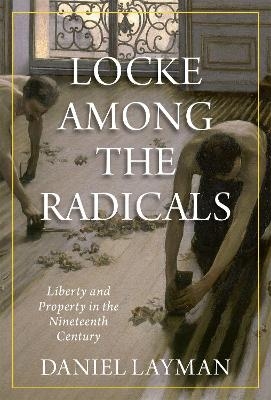
Locke Among the Radicals
Liberty and Property in the Nineteenth Century
Seiten
2020
Oxford University Press Inc (Verlag)
978-0-19-093907-6 (ISBN)
Oxford University Press Inc (Verlag)
978-0-19-093907-6 (ISBN)
Capitalism in the western world is currently facing a crisis of legitimacy in the face of growing inequality. But many forget that the global, capitalist world as we know it today emerged largely during the industrial revolution. Four remarkable thinkers of the long nineteenth century, the Lockean radicals--Thomas Hodgskin, Lysander Spooner, John Bray, and Henry George--responded to the horrid and rampant economic injustices at the time by picking up the loose ends of Locke's property theory and weaving them into two competing strands. Each strand addressed problems of liberty and equality then emerging from industrial capitalism, but each did so in a different way. As Daniel Layman argues, in one camp, Hodgskin and Spooner, libertarian radicals, argued that the world of resources is common to all people only in the negative sense of being originally "unowned" by anyone. According to them, there are no just grounds for state redistribution except to correct past injustices, and governments are typically little more than thieving and oppressive gangs. In the other camp, Bray and George, egalitarian radicals, held that all people have a positive claim to share equally in the world's resources. According to them, states should ensure, through redistributive taxation and other progressive policies, that our institutions respect this common right.
Locke Among the Radicals tells the forgotten story of the Lockean radicals and the crucial role they played in addressing problems latent in Locke's theory. Layman argues persuasively that some of the radicals' insights provide a blueprint for a form of liberal distributive justice possible to achieve today.
Locke Among the Radicals tells the forgotten story of the Lockean radicals and the crucial role they played in addressing problems latent in Locke's theory. Layman argues persuasively that some of the radicals' insights provide a blueprint for a form of liberal distributive justice possible to achieve today.
Daniel Layman is assistant professor of philosophy at Davidson College. He is the co-author (with Michael Huemer) of Do Governments Have Moral Authority? (Routledge, 2021) and numerous articles, chapters, and reviews. Before Davidson, he was a post-doctoral fellow in the Political Theory Project at Brown University.
Introduction: Rights, Property and Freedom
Chapter 1: Locke's Property Problem
Chapter 2: Hodgskin's Libertarian Groundwork
Chapter 3: Spooner: A Libertarian Janus
Chapter 4: Bray's Lockean Socialism
Chapter 5: George: Land, Wealth, and Community
Chapter 6: Towards a New Left-Lockeanism
| Erscheinungsdatum | 08.07.2020 |
|---|---|
| Verlagsort | New York |
| Sprache | englisch |
| Maße | 211 x 140 mm |
| Gewicht | 454 g |
| Themenwelt | Geisteswissenschaften ► Philosophie ► Geschichte der Philosophie |
| Geisteswissenschaften ► Philosophie ► Philosophie der Neuzeit | |
| Sozialwissenschaften | |
| ISBN-10 | 0-19-093907-9 / 0190939079 |
| ISBN-13 | 978-0-19-093907-6 / 9780190939076 |
| Zustand | Neuware |
| Informationen gemäß Produktsicherheitsverordnung (GPSR) | |
| Haben Sie eine Frage zum Produkt? |
Mehr entdecken
aus dem Bereich
aus dem Bereich
eine Geschichte der Zuversicht von Homer bis zum Klimawandel
Buch | Hardcover (2024)
C.H.Beck (Verlag)
CHF 39,20
die kolonialen Wurzeln der französischen Theorie
Buch | Hardcover (2024)
Matthes & Seitz Berlin (Verlag)
CHF 41,90


